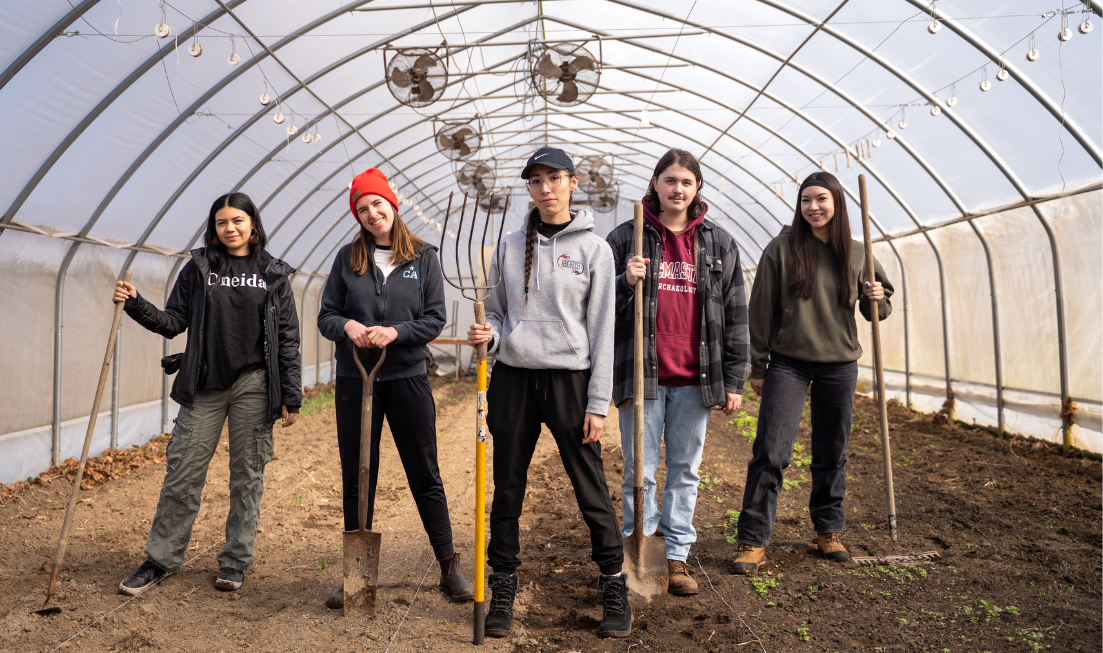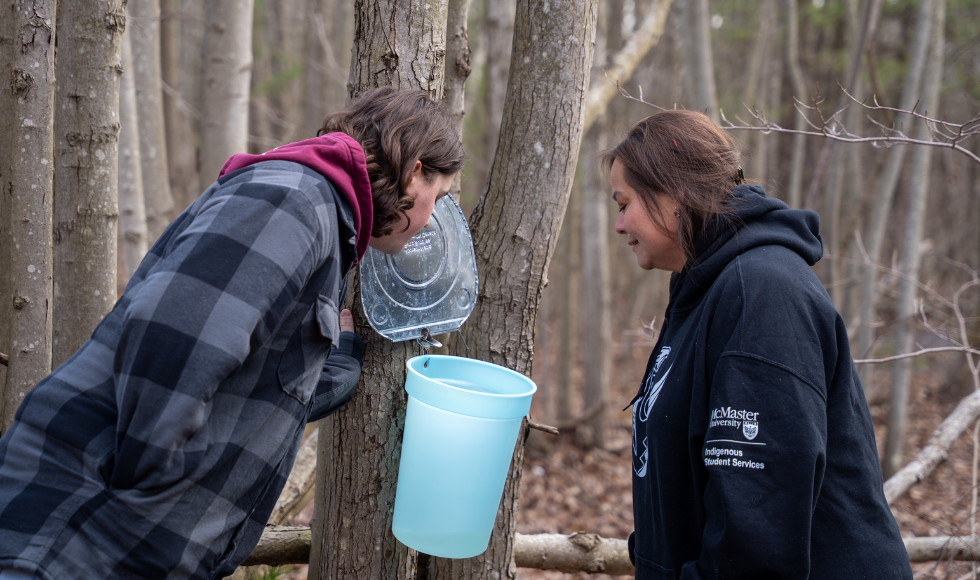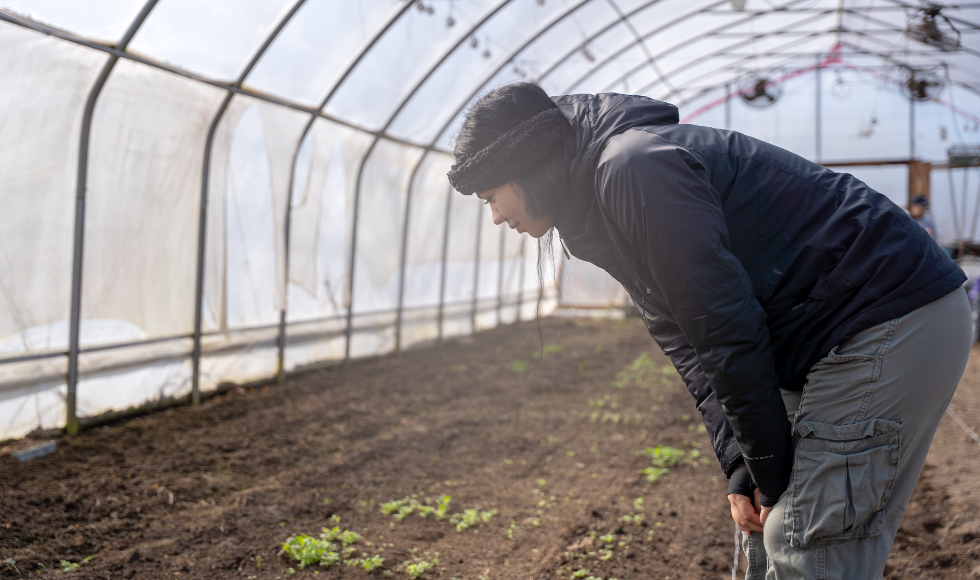‘Every day, it might be a different challenge’

From left: Graduate students Tia Kennedy, Amanda Ayer, Kendal Garlow, Rylan Godbout and Kelsy Chan are working in a local farm's greenhouse as part of the Indigenous Studies Experiential Learning Course. (Photo by Chris Pickles, Faculty of Social Sciences)
On a brisk, sunny day in March, five master’s students and their professor gather on a farm on Six Nations of the Grand River. Class this morning is being held in a sugar bush.
It’s part of the Indigenous Studies Experiential Learning Course, taught by assistant professor Adrianne Xavier, who immerses students in hands-on, land-based learning.
Throughout the semester, students engage with Elders, knowledge keepers and community members, and gain an appreciation for experiential and service learning.
Earlier in March, the students visited a farm near Hagersville to learn about and tap maple trees. Today they’re checking how much sap has been collected.
Walking through the trees, Xavier talks about the Carolinian forest and how to pick a good tree to tap. Topics range from the medicine of sweetwater, to how whole ecosystems exist on a single property, to where we get our food.

The sap collection is small this morning — heavy rains the night before diluted most of the sap that was collected — so they sample the good stuff, empty out the watered-down sap, and set the buckets back up to try again.
For Indigenous Studies MA student Tia Kennedy, the course has been grounding when she’s away from her community at school. The work “helps nourish my spirit and it helps me to be able to keep going on my education journey.”
It has also taught her more about how to build relationships and adapt while doing her community-based research project.
“Every day, it might be a different challenge, but that’s just part of doing research with community,” Kennedy said. “It’s pivoting to where they need you the most.”
Mid-morning, the class moves to a greenhouse on another local farm. Last summer, this farm’s produce fed 60 families in the area. The greenhouse needed upkeep work this year, so Xavier’s class is helping out.
Inside the humid greenhouse, students peel off their layers as they walk up and down the dirt rows. Salad greens and other vegetables they planted earlier this semester are starting to come up.
There’s nothing quite like the feeling after a hard day’s work in the greenhouse, says Amanda Ayer, a Master of Globalization student. “It definitely feels more engaging than reading a 20-page paper.”
“It feels almost surreal that we’re able to do this for a master’s program,” she said. “It’s obviously unlike any other course I’ve taken.”
The course has taught Indigenous Studies MA student Kelsy Chan that “food sovereignty is in everything,” and plays an important role in improving the lives of Indigenous people.
“In a class, it’s like, ‘talk about these readings,’ and there’s a structure to it, but relationships aren’t really built that way.”
— Kendal Garlow, Master of Indigenous Studies student, on building relationships outside of a classroom
It also better prepares them for their future research and career paths.
“I don’t think there are nearly enough white archaeologists in Ontario doing stuff like this, because there’s a long history of extractive research,” said Rylan Godbout, a Master of Anthropology student.
“We’ve talked a lot about that relationship building and getting to come to community… getting to do this, at this point in my career, is extremely valuable to me.”
The long-term impact of experiential work
The Indigenous Studies Experiential Learning Course is a requirement for Kennedy, Garlow and Chan, all in the Master of Indigenous Studies program, which kicked off in 2024. Ayer and Godbout are taking it as an elective.
The course gives them all a unique opportunity to be a part of something bigger, as it focuses on long-term projects, explains Xavier.
“In my view of it, this experiential course was recognizing that part of what I do as a researcher, as a person in my community, as a human, is to be of service, where it’s impactful,” Xavier said.
Students typically have a set amount of time to work on something, whether it’s four months, or a 16-month community-based project. “You get a snapshot of what you think you’re going to talk about,” Xavier said.
But with this course, they’ve taken the inverse approach, with students working on one small element of something larger happening within the community: Their help in the greenhouse benefits the farmer, who now has a greater capacity to provide food for local families.

Ultimately, students “get to be part of something momentous and historic,” Xavier said.
“It sounds dramatic to say that having food in the summer is historic, but when it’s actually grown in this community, for this community, that’s momentous, because that didn’t always happen.”
She wants students to see that research projects might be brief, but the effect of building relationships and research lasts a lifetime.
Garlow’s project, for example, has her engaging with the community and focusing on how Haudenosaunee food is understood.
“Generations from now, people will know the world and our food in a different way every day because of the project that she’s doing,” Xavier said.
We all have the opportunity to be part of something that is far beyond our own reach, Xavier said.
“The thing that we’re tasked with doing is very often minuscule in the big picture. But it’s so impactful.”


